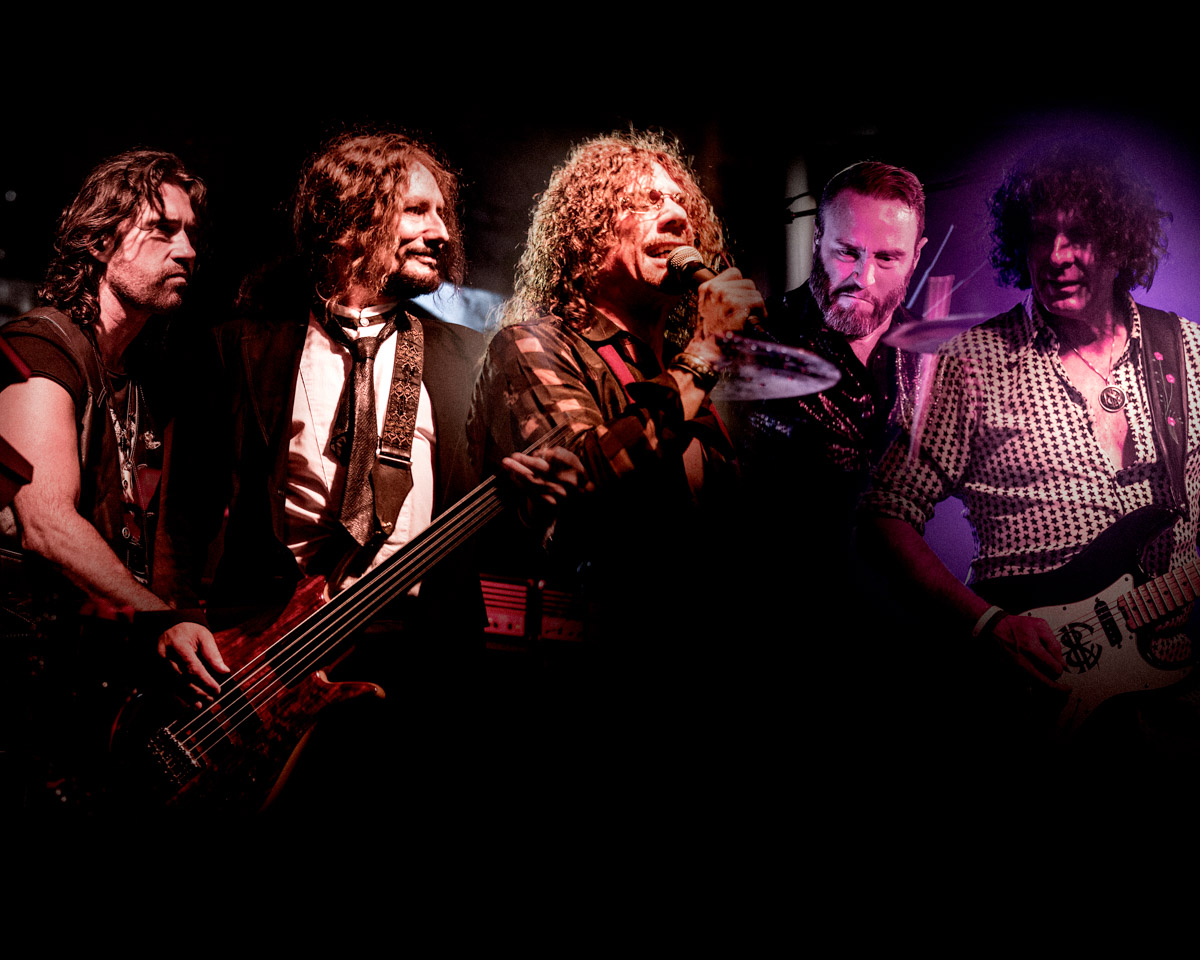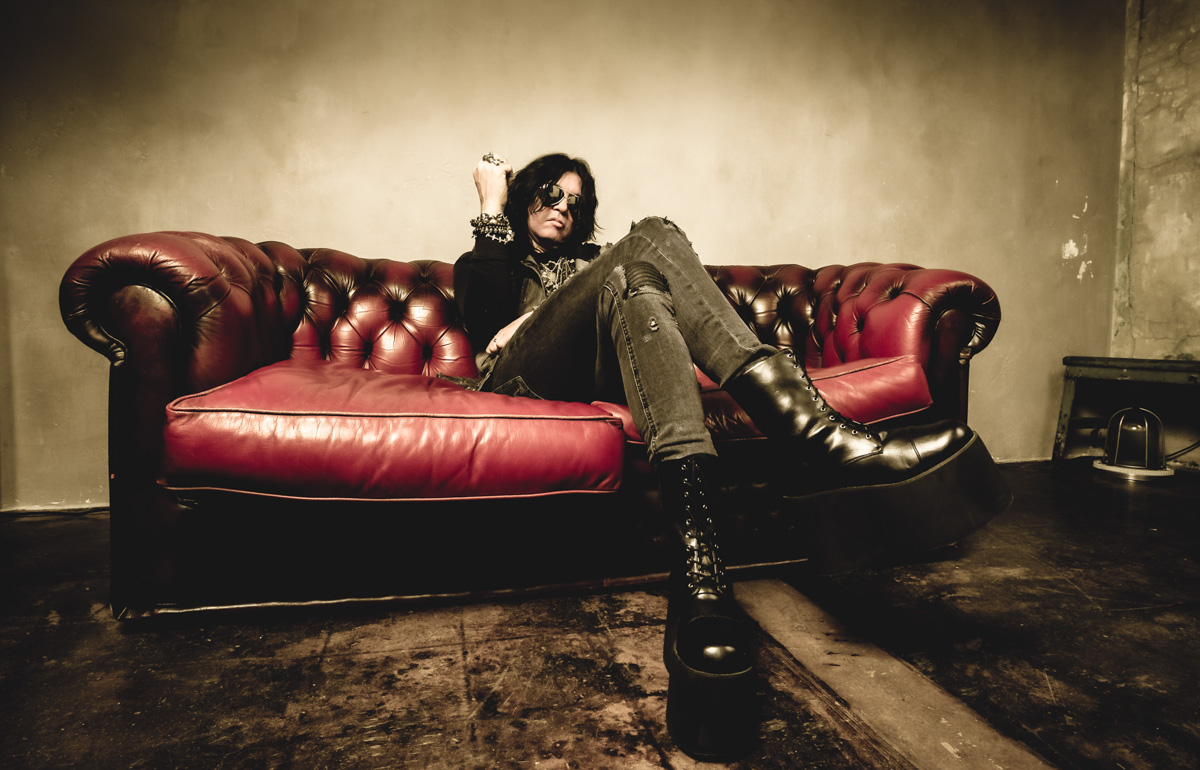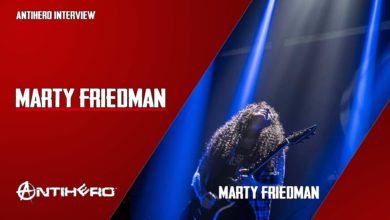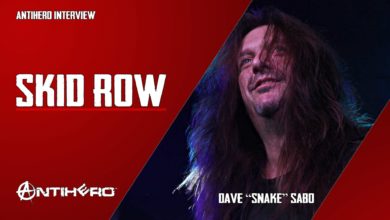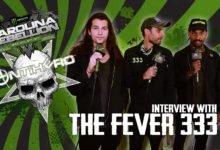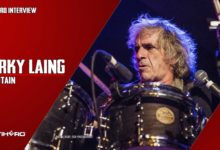A Conversation with Bassist Lynn Sorensen of Heaven & Earth
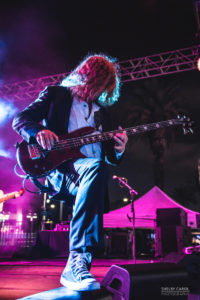 ANTIHERO: I want to talk primarily about the new Heaven & Earth album which has just been released. I was actually quite surprised and really quite ashamed that I had not actually come across Heaven & Earth previously. This album release actually marks my first introduction to the band itself which has been around what, since 2000?
ANTIHERO: I want to talk primarily about the new Heaven & Earth album which has just been released. I was actually quite surprised and really quite ashamed that I had not actually come across Heaven & Earth previously. This album release actually marks my first introduction to the band itself which has been around what, since 2000?
Lynn Sorensen: Yeah, yeah. Yes, it has. I’ve only been in it for about three years now.
ANTIHERO: How did that come about that you hooked up with the band?
Lynn Sorensen: Well, the band went through some changes after the Dig record – personnel, personalities, and a variety of different things. Stuart, the leader of Heaven & Earth, had seen me play with Paul Rodgers and then with Bad Company. And he kind of made a mention that he wanted to do something with me and the opportunity arose. He gave me a call and said, “Lyn, I got a bass player position open, I’ve got a new singer, I’ve got a new record and there’s money involved”. And so, I listened to the record, the Dig record. It’s a pretty good record. And then of course, Joe Retta on vocals. You’ve got to have a great singer. You don’t have a hope in hell without a great singer.
ANTIHERO: Sure. That’s an essential pre-requisite
Lynn Sorensen: In the rock and roll business. And so, he is an amazing singer and I just said, “I’m yours”. So, I called him back and yeah, got the gig.
ANTIHERO: What about the album then itself? Was it all recorded old school? Did you all just get in the studio and jam, maybe throw around a few ideas? Or did you record it, you all sent in your bits separately online via the internet?
Lynn Sorensen: Well, neither one of those really. We got together and cheaply mic’d everything up literally in Stuart’s living room in his house in Woodland Hill and got Kenny Aronoff. At this point, we’d already went through a drumming change and a keyboard change. Ty Bailie went to Katy Perry. Well no, actually Ty Bailie was around but the drummer Jackie Barnes had gone back to Australia and we had to get another drummer. So, Kenny Aronoff came in and we just mic’d everything up in the living room, ran an 8-track digital, home digital machine and started jamming away and we created, you know we’d have a lick, we decided that one’s cool and then we’d start crafting the song out of that arrangement and stuff. So, we did basically a verse, a chorus, if maybe a third part was needed, we would put that in. No heavy production, just the basics and we came up with a lot of those ideas and then Joe went to work putting down vocal ideas to these things. And so, out of that is what really became the stuff we need to do on the record. So, then we went into Kenny Aronoff’s drum studio, and me and him put all the tracks down in a couple of days.
ANTIHERO: What was it like working with him? Because he’s quite a legend in the world of drumming.
Lynn Sorensen: I believe he’s probably played at one time or another with just about everybody. And he’s a great guy, he’s a great hang. You know, his drumming speaks for itself, of course. But just as a person, he’s just a great fun guy to be around. Just a real pleasure to be in the same room with him. Really wonderful.
ANTIHERO: How long did that take to create the album? Because obviously, I mean we’ve talked about Kenny there. He is a busy guy, everybody wants him. Was it kind of rushed?
Lynn Sorensen: Oh yeah. Yeah, everybody wants Kenny. He’s always, you know, and interestingly about him is he really doesn’t have many songwriting credits. He really is. I mean, just everybody wants him, yeah.
ANTIHERO: Returning then to the album. Once it’s out, obviously you guys are going to be out on the road playing some shows, giving birth on the live stages to the songs that the band have created? Anything lined up in terms of specific plans? A timeline or countries, etc.?
Lynn Sorensen: Oh yeah. It’s being formulated as we speak. So yeah.
ANTIHERO: Any plans to move over maybe UK, maybe Europe?
Lynn Sorensen: Oh, I love Europe. We went through Europe… When was it? December of ‘14 and you know, I mean I’ve played a lot with Bad Company and with Paul too. And I love it over there because Europeans are far more cultural. People here in the US are far more commercialized. It’s all about the money here. And a lot of great art gets left in the dust because of commercial viability. Where in places like Europe, if you’ve got something that people want to hear, you’ll find your crowd over there, and they’ll come out and they’ll support you and it’s a great environment for art to flourish, it really is.
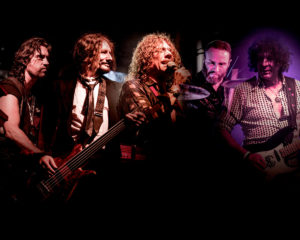 ANTIHERO: As I indicated there at the start, I wasn’t previously familiar with Heaven & Earth and I’m ashamed to admit that being a longstanding rock fan. Do you find that generally that the band have a bigger profile in the States than maybe other areas?
ANTIHERO: As I indicated there at the start, I wasn’t previously familiar with Heaven & Earth and I’m ashamed to admit that being a longstanding rock fan. Do you find that generally that the band have a bigger profile in the States than maybe other areas?
Lynn Sorensen: Well, the band’s out of the States. I mean clearly being here, but that doesn’t necessarily mean… I mean right now, the record, it will find footing in certain places in the world. And of course, then we have to go to those places and support it live. So yeah.
ANTIHERO: What about then it was released, it’s been released through the PledgeMusic format. I was again a little disappointed that I missed out on that. Why choose Pledge and what have been your experiences of going with that format for the release?
Lynn Sorensen: Well, it’s really been my first foray into that kind of release idea. There’s going to be multiple single releases and in different places. It certainly will be released out in Europe and available everywhere eventually here. So, it’s just going to be… The managers, so to speak, have their idea of how these things can go and of course, whenever you’ve got a band like this, you have the eternal battle between the management and the artists. So, it’s an old story of course, as you know.
ANTIHERO: It generally seems to be a good format, in terms of connecting with fans on a more personal level.
Lynn Sorensen: Oh yeah, yeah. We want to, I’d like to… I mean you have to have contact with people and when people reach out to you you’ve got to take the time to somehow reach back. I mean, it’s the reason why we’re still here, a lot of us are still in this business, because of the people. Without them we don’t have any hope. So, it’s really important to have that kind of presence out there.
ANTIHERO: You’re primarily known in the rock world for your bass playing, but that’s not your only instrument I understand.
Lynn Sorensen: Oh no, actually I’m a singer too. I’m lead and backup, and of course, one of the things that makes me attractive in a band is I can sing and play bass and there’s not a lot of those guys around. So, singing and playing bass is a much more difficult thing than singing and playing guitar or even really singing and playing drums, because bass is a complex of rhythm and melodic elements, and the melodic elements are never what the vocal elements are. So, you’re really splitting your brain up and I’ve played violin since I was nine.
ANTIHERO: That’s what I was hinting more at with my question.
Lynn Sorensen: Yeah, I studied classical music heavily for nine years. In fact, that was what I was going to do. And I was going to go off into college and get into a symphony orchestra. I auditioned to Seattle Symphony when I was 17 and got in the finals there. But for me, I saw The Who.
ANTIHERO: Yeah, and that was it I assume? Career choice made right there?
Lynn Sorensen: I looked around and I’m 16 and I saw the girls going crazy, and I looked at this band who even in the structures of rock and roll was different, because you had basically a drummer and a bassist that were soloists and you had Pete Townshend who was holding the band down with his rhythm guitar and Roger Daltrey, and all the girls going absolutely crazy. And I went, “oh my god, what am I doing?” I mean, this is way too cool, and of course the emotional artistic expression of freedom with those expressions are infinitely greater with rock music than in classical. And then I saw the first incarnation of Jon McLaughlin, Mahavishnu. Of course, there was Jerry Goodman on electric violin and that was a door that opened up and made me go through it. When I felt that guy play electric violin I went, “okay”. So, I went and got a Barbera pickup stuck on my violin and started to learn blues licks on the violin, and the rest is pretty much history. I just teach myself whatever instruments I want to play. I mean, from my classical background and all the technical knowledge you have to have to do that, that made it very easy for me to learn any instrument I wanted to.
ANTIHERO: What musical style or genre do you find challenges you the most?
Lynn Sorensen: Everything has its idiosyncrasies and its charm, and you know, people ask me what’s my favourite song, what’s my favourite band. I don’t have one. I mean, I still go crazy every time I hear “Four Seasons” by Vivaldi. In fact, people have asked me the question before, “who would you like to talk to if you could talk to them?”, that would be one guy I would like to speak with, because his unbelievable passion he was able to put out in his music. It would just be a joy to be able to bring him back alive and speak with him. You know, I got out of classical music by getting heavily into blues and then you know, my dad was a big rat pack guy and swing bands. I’ve listened to all of the swing band records when I was little and it’s an amalgamation of all these musical influences that has created really what I am today.
ANTIHERO: You mentioned one British classic rock band there in The Who. How did you go then to actually playing in Bad Company and what was your first introduction to the music of Bad Company?
Lynn Sorensen: Well, my first introduction to Bad Company is I saw them, I believe it was ’74 in Seattle out here. They opened for the Edgar Winter Group and I was just a punk kid and I went and saw them and of course Paul Rodgers’s voice, hearing it on the school bus. “All Right Now” is really the first exposure to Free here in the States, where it became commercially viable to listen to Free and of course his voice was very distinctive. Him and basically Steve Marriott at the time had those kinds of voices and it really grabbed me on the radio of course, and so I get a call in 2000. I knew the drummer that played in Paul Rodgers’s solo band and he calls me up and says, “Lynn, the current bass player wants to take the weekend off and I think you’d be good to replace him for a weekend”. And so, they gave me a work tape, they came out and saw me play and said, “Yeah, you’ll be fine”. The suits came out and saw me and I got a work tape of a previous show and I could tell that I… I mean, not to be, not to sound arrogant in any fashion, but I could tell I could play a little better than the guy. And the other guy they had didn’t sing and I sang. And so, then I smelt blood on the job when I went in and I said, “today I don’t screw up, today’s my day”. So, my first show with Paul was in front of 50,000 in an outdoor show outside of Vegas.
ANTIHERO: Nice quiet introduction for you then with that. Just a small one, just a small one. But that must have been a real buzz for you?
Lynn Sorensen: Oh absolutely. I mean I walked up. I think it was probably “Feel Like Making Love” was the first song and I walk up, and I just walk right up to the microphone an start singing a third above Paul and Paul looks over at me because I don’t know if he knew what to expect from me in that way and he gives me a little nod and you know, I was more enamored with the fact that I was actually singing harmony with Paul Rodgers on stage than the thousands of people that were out there. I just went, “oh my god, this is so cool. What am I doing?” Yeah, so I got the gig and then I fell into the Bad Company gig of course because Boz was dead and he’d died a couple years earlier and they got back together, so right place, right time.
ANTIHERO: And of course, you played, you went on and stayed with Paul Rodgers in his solo band as well.
Lynn Sorensen: Oh yeah, oh yeah for quite a while.
ANTIHERO: So, turning back to Heaven & Earth. This is your full-time gig now then yeah?
Lynn Sorensen: Well, I play a lot of different things.
ANTIHERO: Yeah, I noticed that.
Lynn Sorensen: All over, especially here in the Seattle area, but it is my main thing right now, it is my deal. I’m back and forth from Seattle every week down to LA and then back up here on the weekends. Yeah.
ANTIHERO: So, music is something. Do you have any spare time, hobbies or interests or is music everything?
Lynn Sorensen: Lately I haven’t. I mean I’m producing a few projects up here in the studio.
ANTIHERO: Any new names?
Lynn Sorensen: Well, just some local. I do some things also with Ronnie Lee down in LA. She was with Kim Fowley and had a band Venus and The Razorblades back in the day, and I’ve done a bunch of stuff with her and been on some things. So yeah, I just don’t lately. I think I’m busier than I’ve ever been ever right now. It’s crazy.
ANTIHERO: Which is good and a nice way to be, because a lot of musicians that I’ve talked to they’ve said it’s more difficult now to sustain a living being a musician.
Lynn Sorensen: Right. Oh yeah. Yeah. It’s a hard gig to do. I mean, if I put this kind of effort into the corporate world, I probably would have been extraordinarily wealthy by now. But probably been an alcoholic on my fifth marriage.
ANTIHERO: You’ve toured over the years, and you mentioned Bad Company and different musical projects. I just wondered which country for you would be the most enriching and rewarding? Where do you like going when the tour dates come out?
Lynn Sorensen: I love England. I love England. I’ve played with Paul. I’ve played just about every place you could play in London. And I just love that town. Of course, with being from the States, anything 50 years old is old in the States. I think you start around 1000 years over there in England. So, it is always something to see. Remnants of the civilization goes back that far when you’re basically from here, the States. So, I really love England. I love Europe actually as I eluded to, you can find a market and people that want to come out and support you over there. It’s really cool.
ANTIHERO: What song still personally takes you and moves you to a plain mentally every time you hear it? Is there one track? Maybe just something, maybe your first introduction to music maybe, just a track that you’ve heard many, many times going way back over the years, but it always connects?
Lynn Sorensen: Oh, I love Frank Sinatra. He is one of my favourite singers, and him singing “Fly Me to the Moon” just gets me to this day.
ANTIHERO: Something a bit different then.
Lynn Sorensen: Yeah.
ANTIHERO: Future plans for the band? Obviously, you’ve got a burst of promo for the record and then you mentioned tour dates.
Lynn Sorensen: Yeah, there’s talks of buy-ons on some tours and that would give us a lot of exposure and you know, just going out and finding a market to get a hold of on radio stations and things around the world and going out to those areas and supporting the record there.
ANTIHERO: Okay, that’s great. Thank you very much. I’m glad we got there in the end. Cheers. Thank you very much.
Lynn Sorensen: You betcha my friend.

